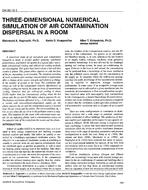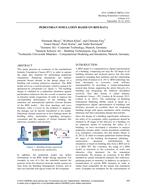The ASHRAE Handbook of Fundamentalsl represents the solar insolation at a surface under clear sky conditions as a function of the apparent solar irradiation at air mass zero, A; the atmospheric extinction coefficient, B; and C, the ratio of the diffuse irradiation on a horizontal surface to the normal incident irradiation. The magnitude of each depends on the number of dry air molecules (atmospheric pressure), the precipitable water vapor, and other aerosols in the earth’s atmosphere that are in the path of the solar beam.
Experimental measurements are required to confirm the validity of the suggested theoretical values or’to establiSh suitable magnitudes for A, Band C at a specific location since local climatic conditions may influence their magnitude. Meteorological services routinely measure the solar insolation received on a horizontal surface but, unfortunately, measurement of the normal incident insolation is recorded for only a few locations. Until additional normal incident insolation records become available, it may be useful to try and utilize the horizontal insolation to give approximate values for A, B and C. Hopefully, these will confirm the values suggested by ASH~AE but, if differences occur, the results may be of sufficient accuracy to establish tentative design criteria until the experimental data become available. The purpose of this discussion is to outline some of the methods that may be used in the attempt to obtain A, B and C from the horizontal insolation, discuss some of the difficulties that may be encountered, and consider a particular approximate solution.
Citation: ASHRAE Transactions, Volume 79, Part 2, Louisville, KY
Product Details
- Published:
- 1973
- Number of Pages:
- 5
- File Size:
- 1 file , 440 KB
- Product Code(s):
- D-LO-2285


